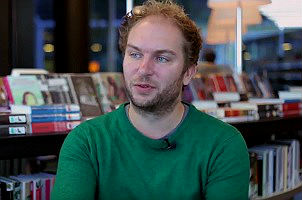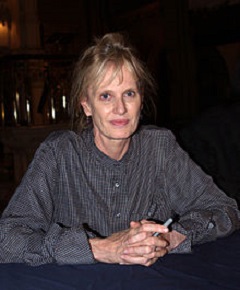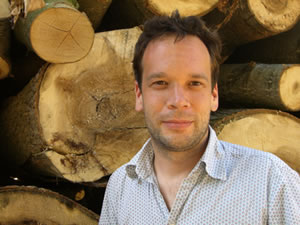De Peuaanse schrijver Alfredo Bryce Echenique werd op 19 februari 1939 in Lima geboren. In 1957 begon hij aan de studies rechten en literatuurwetenschap aan de San Marcos universiteit. In 1963 werd hij advocaat. In 1964 studeerde hij af op Hemingway en kon hij met een beurs naar Frankrijk om aan de Sorbonne aan een promotie te werken. Als docent werkte hij aan verschillende scholen en universiteiten. In 1984 trok hij naar Madrid en vestigde zich er als zelfstandig schrijver. Zijn eertse roman “Un mundo para Julius” (1970) (duitse titel “Eine Welt für Julius”) werd meteen een groot succes. Sindsdien publiceerde hij meer dan twintig boeken.
Uit: Eine Welt für Julius (Vertaald door Matthias Strobel)
“Erinnerst Du Dich – wenn meine Mutter uns, als wir noch Kinder waren, auf ihre Reisen mitschleppte, dann verflüchtigten wir uns aus dem Schlafwagen, um in den anderen Waggons umherzustreifen oder die Wartesäle dritter Klasse zu durchforschen. Leute, die da in einem überfüllten Abteil saßen und schliefen, den Kopf auf die Schulter eines Unbekannten gelegt, oder gar auf dem Boden, machten gewaltigen Eindruck auf uns. Sie schienen uns irgendwie wirklicher als die Menschen, die mit unseren Familien verkehrten. Eines Abends, wir fuhren gerade von Cannes nach Paris zurück, beobachteten wir auf dem Bahnhof von Toulon Reisende der dritten Klasse, die von einem Brunnen auf dem Bahnsteig tranken; ein Arbeiter bot dir aus einer Feldflasche Wasser an; Du hast sie mit einem Zug geleert, und dann hast Du mich triumphierend angesehen, ein kleines Mädchen, das die erste Eroberung seines Lebens gemacht hat. Du warst gewiß mindestens ebenso hochgestimmt wie am Morgen nach Deinem ersten Liebhaber. Wir sind geborene Passagiere der ersten Klasse; doch entgegen den Bestimmungen, die auf Schiffen gelten, scheint auf der Bahn den Leuten der ersten Klasse die dritte Klasse verboten zu sein.«

Alfredo Bryce Echenique (Lima, 19 februari 1939)
De Nederlandse schrijver Mark Prager Lindo, beter bekend als Den Ouden Heer Smits werd geboren in Londen op 19 februari 1819. Zie ook mijn blog van 19 februari 2007
Uit: De vijfdaagsche veldtocht.
“Groot is de vreugde over deze eerste schitterende zege. Enkele vermetele stemmen doen zich hooren en stellen voor, door te stoomen en Brussel nog dien avond te vermeesteren. Wij vermoedden toen niet welke hinderlagen de Antwerpenaren voor ons gelegd hadden.
Alweer luide hoera’s! Dáár is het Antwerpsch slagveld! Daar klinkt trotsch en hartverheffend het Nederlandsche volkslied. Daar wappert de Nederlandsche vlag. Daar staan tallooze helden geschaard; – dat zijn zeker hulptroepen, door onzen aanvoerder bijeengebracht. ‘Voorwaarts in den stormpas!’
Wij hadden geen vijf schreden uit de veilige wagens gedaan, toen een levendig vuur van ‘welkom! bravo! Nederland hoog!’ van alle kanten in onze gelederen sloeg en ons tot staan bracht. Daarop een geweldige aanval, – tien man tegen één; zij drukten ons de hand, zij sloegen ons op den rug; zij ontweldigden ons de bagage, – niet eens eene parapluie bleef ons over!
Er was niet eens sprake van capituleeren. De verraderlijke Antwerpenaren hadden ons volkomen overrompeld. ‘Geef u op genade en ongenade over!’ klonk het overal. En wij, die reeds ons hoofd kwijt waren
, bezweken. Van dat oogenblik af waren wij gevangenen op parole, in handen der Antwerpenaren.”
Mark Prager Lindo (19 februari 1819 – Den Haag, 9 maart 1877)
De Oostenrijkse schrijver Wolfgang Fritz werd geboren op 19. Februar 1947 in Innsbruck. Fritz studeerde rechten en werkte van 1981 tot 2002 op het ministerie van financien. Daarnaast bleef hij schrijven. In de jaren tachtig verschenen de romans Zweifelsfälle für Fortgeschrittene en Eine ganz einfache Geschichte. Na wat wetenschappelijk werk volgde in 2004 de roman Das Bollwerk.
Uit: Zweifelsfälle für Fortgeschrittene
“Es war ein Mensch von etwa fünfzig Jahren, ein Mann namens Taras Vanyocki.
Seine Haare waren schon grau, wurden auch schütter; aber Glatze hatte er keine. Er wusch sein Haar selten, es klebte ihm in Strähnen am Kopf, und zwischendurch schimmerte die graue Kopfhaut. Gut roch es nicht, dieses ungewaschene Haar, aber man muß zu seiner, Vanyockis, Verteidigung sagen, für andere wahrnehmbar gestunken hat es auch nicht. So weit ließ es ein Herr Taras Vanyocki nicht kommen. Noch türmte sich zwischen den Müllkübelstierern und ihm ein sozialer Großglockner. Es durfte halt niemand seine Nase in Vanyockis Haare stecken, und Herr Taras pflegte derlei Vertraulichkeit auch nicht zu genießen. Er hielt sich allein. Er wußte nicht, was aus seiner vormaligen Frau geworden war, hätte es wohl auch nicht wissen wollen. Wenn ihn jene unbestimmten Sehnsüchte ankamen, die manche Männer in die tollsten Torheiten treiben, so kaufte er sich eine Flasche Wein, trank sie aus, schlief vierzehn Stunden lang, erwachte mit einem Hornissenschädel und – hatte schon wieder andere Sorgen.”

Wolfgang Fritz (Innsbruck, 19 februari 1947)
De Duitse dichter en schrijver Björn Kuhligk werd geboren op 19 februari 1975 in Berlijn. Hij debuteerde in 1995 met de dichtbundel Dann ziehe ich los, Engel suchen. Sindsdien publiceerde hij regelmatig in literaire tijdschriften, bloemlezingen en op internet. Hij is mede-uitgever van verzamelbundels, waarin jonge schrijvers voorgesteld worden. Ook leidt hij de werkgroep „open poems“van de Literaturwerkstatt Berlin.
DER SCHÖNE 38. SEPTEMBER
In dieser Starkstromnacht, in dieser
vom Anfang bis zum offenen Ende
durchdachten Großtraumanlage
baldowert der Mond, der Mürbeteigkeks
über den von Wolkenfäden zersägten Himmel
und die Hände, was sollen diese Hände
heute wurden 1000 Senegalesen
als Botenstoffe Europas zurückgeschickt
das Wetter, so bei AOL, wird geladen
und du, du hörst das Zusammenwachsen
der Fontanellen aller Säuglinge
dieser Stadt, du Pathos-Arsch
Björn Kuhligk (Berlijn, 19 februari 1975)
De Amerikaanse dichteres en schrijfster Kay Boyle werd geboren op 19 februari 1902 in Saint Paul, Minnesota. Zij groeide voornamelijk op in Europa, waar zij ook haar opleiding kreeg. Bij het begin van WO I keerde de familie terug naar de VS. In 1923 trouwde Boyle en trok met haar man naar Frankrijk. Kort daarna begon zij gedichten en korte verhalen te publiceren in invloedrijke bladen als Broom en transition. In 1929 verscheen haar eerste boek Wedding Day and Other Stories. Haar eerste roman Plagued by the Nightingale verscheen in 1931.
For James Baldwin
Black cat, sweet brother,
Walk into the room
On cat’s feet where I lie dying
And I’ll start breathing regularly again.
Witch doctor for the dispossessed,
Saint tipping your halo to the evicted,
The world starts remembering its postponed loyalties
When I call out your name. I knew you hot nights
When you kept stepping
The light fantastic to music only the wretched
Of the earth could hear; blizzards
In New Hampshire when you wore
A foxskin cap, its tail red as autumn
On your shoulder. In the waters of the Sound
You jumped the ripples, knees knocking,
Flesh blue with brine, your fingers
Cold as a dead child’s holding mine.
You said it all, everything
A long time ago before anyone else knew
How to say it. This country was about to be
Transformed, you said; not by an act of God,
Nothing like that, but by us,
You and me. Young blacks saw Africa emerging
And knew for the first time, you said,
That they were related to kings and
To princes. It could be seen
In the way they walked, tall as cypresses,
Strong as bridges across the thundering falls.
In the question period once
A lady asked isn’t the integration a two-way
Street, Mr. Baldwin, and you said
You mean you’ll go back to Scarsdale tonight
And I’ll go back to Harlem, is that the two ways
You mean?
We were a race in ourselves, you and I,
Sweet preacher. I talked with our ancestors
One night in dreams about it
And they bade me wear trappings of gold
And speak of it everywhere; speak of it on
The exultant mountain by day, and at night
On river banks where the stars tou
ch fingers.
They said it might just save the world.
Kay Boyle (19 februari 1902 – 27 december 1992)
De Duitse dichter en schrijver Paul Zech werd geboren op 19 februari 1881 in Briesen. De thema’s uit zijn eerste gedichten waren nog traditioneel zoals de natuur. Vanaf 1911 schreef hij ook gedichten over de grote stad en de arbeiderswereld, op een manier die schatplichtig was aan het expressionisme. In 1912 was hij vertegenwoordigd in Kondor, de eerste, door Kurt Hiller, uitgegeven bloemlezing van het vroege expressionisme. In de latere beroemde bloemlezing van Kurt Pinthus, Menschheitsdämmerung uit 1919, was hij vertegenwoordigd met 12 gedichten. Na WO I vond hij ook erkenning als schrijver van proza.
Lebenslied
Sommerstunden
krummgeschlossen
an Maschinen,
vor Turbinen,
schweißbegossen
schwarz voll Wunden:
kannst du deine Brust noch heben?
Bruder, kannst du so noch leben?
Mit den Tieren
in den Gassen
hingekauert,
frostumschauert
hinkrepieren:
Bruder, schon so tief gefallen,
wachsen dir nicht endlich Krallen?
Hammerhände
und Prothesen
losgelassen!
Wenn sie fallen,
sind gewesen
Turm und Wände.
Hier die Brust; jetzt könnt ihr knallen!
Blut wird uns zusammenballen.

Paul Zech (19 februari 1881 – 7 september 1946)
De Duitse schrijver Heinrich Leopold Wagner werd geboren op 19 februari 1747 in Straatsburg. Hij stond in contact met alle belangrijke schrijvers van de Sturm und Drangs zoals Johann Wolfgang von Goethe, Friedrich Maximilian Klinger, Jakob Michael Reinhold Lenz, Christoph Kaufmann, Christian Schubart en Maler Müller. Samen met Klinger en Lenz werd hij tot de Goethianer gerekend omdat zij tot de intiemste vrienden van Goethe behoorden.
Uit: Die Kindermörderin
“FRAU HUMBRECHT. Na so denn! weil ich dir doch eine Freude hab machen wollen; und weil uns der Herr Leutenant so viel Ehr erzeigt, so will ich’s denn nur erlauben – dein närrischer Vater läßt dich ja so nie aus dem Haus.
VON GRÖNINGSECK. Das heiß ich geredet: wenn man nur selten ans Vergnügen kommt, so muß man’s auch r
echt genießen, zudem ist heute der letzte Ball für dies Jahr: also – frisch Evchen! nicht so geleppert, das Glas muß aus: Evchen leert’s. So bist brav! sollst auch ein Mäulchen haben! – Küßt sie. Holà! la maison! Marianel macht die Tür auf. Punsch! Magd wieder ab.
EVCHEN. Was ist denn der Punsch eigentlich für ein Getränk, Mutter?
FRAU HUMBRECHT. Ich weiß selbst – es ist halt –
VON GRÖNINGSECK. Wie Evchen, du weißt nicht, was Punsch ist, [1461] hast noch keinen getrunken? – Ihr Leute lebt ja, wie die Bettelmönche – schon achtzehn Jahr alt, und heut zum erstenmal auf den Ball gewesen, und weiß nicht, was Punsch ist? – Ein Nektar! ein Göttertrank ist’s! le diable m’emporte, s’il n’est pas vrai! Wenn ich König von Frankreich wär, so wüßt ich mir dennoch kein delikaters Gesöff zu ersinnen, als Punsch; der ist und bleibt mein Leibtrank, so wahr ich – Ah le voilà! Marianel bringt drei Schoppengläser auf einem Kredenzteller; er nimmt ihr eins nach dem andern ab, beim ersten, das sie ihm hinhält, frägt er sie. Ist das vom Rechten?”
Heinrich Leopold Wagner (19 februari 1747 – 4 maart 1779)
De Russische schrijver Yuri Olesha werd geboren op 19 februari 1899 in Elizavetgrad (nu Kirovohrad, Oekraïne). Hij groeide op in Odessa en studeerde aan de universiteit van Novorossiya.Daar onderging hij de invloed van schrijvers als H. G. Wells, Robert Louis Stevenson en Tolstoi. In Engelstalige landen werd hij bekend door twee bundels short stories Love and Other Stories en The Cherrystone, maar zijn belangrijkste boek is de roman Envy uit 1927.
Uit: Envy
„He [Andrei] wants to turn you into homeless tramps, roaming the wilderness of history. Wives, he is spitting into your soup. Mothers, he dreams of wiping family resemblances from your babies’ little faces, the beautiful, sacred family resemblance. He violates your lilttle secret corners, scurries like a rat along your shelves, pokes under your bed, crawls under your shirts, sniffs at the hair of your armpits. You must send him to hell!
See this pillow? I am the king of pillows. Tell him: We wish to sleep, each of us on her own pillow. Don’t you dare touch our pillows! Our heads have rested on them, our kisses have fallen on them during our nights of love, we have died on them and those whom we have killed have died on them, too. Keep your hands off our pillows! Stop calling to us! Stop beckoning to us, trying to lure us! What can you offer us to replace our capacity to love, to hate, to hope, to cry, to pity, to forgive? See this pillow? It is our coat of arms. Our symbol. Bullets get buried in a pillow. With a pillow we shall smother you.”

Yuri Olesha (19 februari 1899 – 10 mei 1960)
Rectificatie: De Franse dichter en essayist André Breton werd geboren in Tinchebray in het departement Orne op 19 (en niet 18) februari 1896. Zie ook mijn blog van 18 februari 2007 en ook mijn blog van 18 februari 2008.
Le Verbe Être
Je connais le désespoir dans ses grandes lignes. Le désespoir n’a pas d’ailes, il ne se tient pas nécessairement à une table desservie sur une terrasse, le soir, au bord de la mer. C’est le désespoir et ce n’est pas le retour d’une quantité de petits faits comme des graines qui quittent à la nuit tombante un sillon pour un autre. Ce n’est pas la mousse sur une pierre ou le verre à boire. C’est un bateau criblé de neige, si vous voulez, comme les oiseaux qui tombent et leur sang n’a pas la moindre épaisseur. Je connais le désespoir dans ses grandes lignes. Une forme très petite, délimitée par un bijou de cheveux. C’est le désespoir. Un collier de perles pour lequel on ne saurait trouver de fermoir et dont l’existence ne tient pas même à un fil, voilà le désespoir. Le reste, nous n’en parlons pas. Nous n’avons pas fini de deséspérer, si nous commençons. Moi je désespère de l’abat-jour vers quatre heures, je désespère de l’éventail vers minuit, je désespère de la cigarette des condamnés. Je connais le désespoir dans ses grandes lignes. Le désespoir n’a pas de coeur, la main reste toujours au désespoir hors d’haleine, au désespoir dont les glaces ne nous disent jamais s’il est mort. Je vis de ce désespoir qui m’enchante. J’aime cette mouche bleue qui vole dans le ciel à l’heure où les étoiles chantonnent. Je connais dans ses grandes lignes le désespoir aux longs étonnements grêles, le désespoir de la fierté, le désespoir de la colère. Je me lève chaque jour comme tout le monde et je détends les bras sur un papier à fleurs, je ne me souviens de rien, et c’est toujours avec désespoir que je découvre les beaux arbres déracinés de la nuit. L’air de la chambre est beau comme des baguettes de tambour. Il fait un temps de temps. Je connais le désespoir dans ses grandes lignes. C’est comme le vent du rideau qui me tend la perche. A-t-on idée d’un désespoir pareil! Au feu! Ah! ils vont encore venir… Et les annonces de journal, et les réclames lumineuses le long du canal. Tas de sable, espèce de tas de sable! Dans ses grandes lignes le désespoir n’a pas d’importance. C’est une corvée d’arbres qui va encore faire une forêt, c’est une corvée d’étoiles qui va encore faire un jour de moins, c’est une corvée de jours de moins qui va encore faire ma vie.

André Breton (19 februari 1896 – 28 september 1966)
Geschilderd door Max Ernst




















